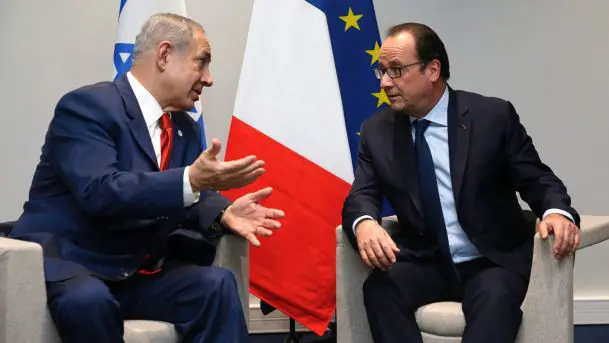Paris is now working hard to sell to the international community its initiatives to end the stalemate in the peace process between Israel and the Palestinians, yet its efforts may not fare well in the face of plain rejection by the rival parties.
On Friday, an international meeting of foreign ministers was convened in Paris to over the peace impasse. Top diplomats from dozens of nations, including U.S. Secretary of State John Kerry, attended the meeting, while the two "leading actors" -- Israel and the Palestinians -- were not invited.
Actually, Israel had said on Thursday the initiatives aimed at reviving the stalled peace process between Israel and the Palestinians are "doomed to fail."
"The only way to get a stable regional arrangement that will allow us to create true peace is if parties in the Middle East come to understandings between them," Israel's head of the Foreign Ministry Dore Gold said on the eve of the meeting of foreign ministers in Paris to set up the groundwork for a international peace conference later this year.
"We believe the Arab states would give backing to direct negotiations between Israel and the Palestinians," he added.
On Wednesday, Israeli Prime Minister Benjamin Netanyahu slammed the French efforts to organize a peace summit, saying peace is not achieved with international conferences.
"The way to peace does not go through international conferences that seek to impose agreements, make the Palestinians' demands more extreme and thereby make peace more remote," Netanyahu said, according to a statement issued by his office.
Following the half-day meeting in Paris, a statement released on Friday by the Israeli Foreign Ministry once again blasted the peace summit as "missed opportunity," accusing the international community of "yielding" to the demands of Palestinian President Mahmoud Abbas.
"Instead of urging Abbas to respond to calls from Prime Minister (Netanyahu) to start direct negotiations immediately and without preconditions, the international community responded to Abbas' demand, allowing him to keep avoiding direct bilateral negotiations without preconditions," the ministry said.
"It will go down in history that the conference in Paris simply resulted in hardened Palestinian positions and distant peace," the ministry charged.
On the other hand, although the Palestinian National Authority and President Abbas supported the initiatives, the Islamic Hamas movement, which rules the Gaza Strip, announced Monday that it opposes the current French initiatives.
Sami Abu Zuhri, Hamas spokesman, slammed Abbas for supporting it, adding "Abbas' decision to support the initiatives never represent the Palestinian people and doesn't enjoy a full Palestinian consensus."
Ismail Haneya, Hamas deputy chief, vowed Sunday in Gaza that his movement and other Palestinian factions would resist the initiatives aimed at settling a peace treaty with Israel.
He predicted that all these initiatives "carry the seeds of failure" in a rally in Gaza on the 49th anniversary of the Israeli military occupation of the Palestinian territories.
The Islamic movement has been ruling the Gaza Strip since it violently took control of the coastal enclave in the summer of 2007, and it said Israel pulled out from Gaza due to armed resistance, not due to peace treaties.
Israel occupied the West Bank, east Jerusalem and Gaza Strip territories in the 1967 Middle East War.
The last round of peace talks between Israel and the Palestinians took place between July 2013 and April 2014 with the mediation of the U.S., but ended abruptly without results.
International calls to restart peace talks came amid an ongoing wave of violence which started in October and claimed the lives of 28 Israelis and 205 Palestinians.
(APD)
 简体中文
简体中文












